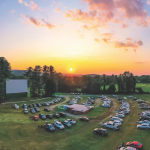From the FOH position, you can pretty accurately gauge the impact the show is having on the house, but what if you want to gauge the effect your industry is having on the economy? That's something that your U.K. counterparts have a better handle on now, thanks to a survey from UK Music, an umbrella organization representing the collective interests of a broad range of sectors of the U.K.'s commercial music industry. The report found that large-scale live music events, such as festivals, are contributing over £1.4 billion a year – that's $2.3 billion – to the U.K. economy from all sources, including ticket sales and travel to the event locations.
The survey found that, in 2009, there were at least 7.7 million visits to music-themed events, and added that what people spent on them was enough to sustain nearly 20,000 jobs. Overseas tourists alone spent $317.5 million on concerts and more than $76 million on festivals in 2009.
A Murkier Picture
It's hard to know if live music is having a similar effect here. Ticket sales in the U.S were down about 15 percent last year, according to Pollstar, and gas price increases coming right at the start of the summer touring season are doing the opposite of creating jobs – tours are consolidating, heading out on the road with smaller systems and fewer buses, trucks and people aboard them. Then again, there's no analogous organization to UK Music in the U.S.; our data tend to come from disparate and often diffuse sources, ranging from publications like Pollstar and Billboard to extracts and interpolation of the financials of companies like Live Nation and AEG Live, whereas UK Music can poll its constituencies – musicians, recording artists, composers, major and independent record labels in the form of the British Phonographic Institute (BPI), artist managers, music publishers, record producers (from members of the Music Producer Guild) and the British Performing Right Society.
This has given the U.K. music business, including its live performance component, another thing that we don't have over here: a comprehensive lobbying presence. In addition to education and market research, the organization also interfaces with government entities in Britain and in the E.U. For instance, Feargal Sharkey, UK Music's chief executive, used the new survey as an opportunity to call on the British government to create a strategy to boost live-music tourism, thereby increasing the number of visitors to the U.K. and raising all boats. "The role of music in terms of creating jobs, in terms of sustaining businesses and in terms of attracting visitors to all regions of this country comes over loud and clear," he said in a statement, underscoring a survey point that almost half of the total £1.4 billon-plus expended on live music was spent outside music events, in local businesses such as hotels and restaurants.
Specific Recommendations
In addition to its broader linkage between live music performances and the U.K.'s economy, though, UK Music made some very specific recommendations to Her Majesty's government. These include, according to a BBC report on the survey, addressing concerns over the difficulties that overseas performers encounter with the UK's visa system; working with the music industry to ensure that fans have an industry-approved facility to trade and sell on any tickets to live music events that they no longer need (ever tried to return a ticket to Ticketmaster?); and encouraging live music at the grass roots by exempting small venues from the restraints of the U.K. 2003 Licensing Act, which imposes strict live-performance licensing regulations on even the smallest of venues. (Try to imagine if New York City's Byzantine cabaret license process were applied everywhere in the U.S.)
The music industry in the U.S. does pursue its own lobbying efforts. The National Academy of Recording Arts & Sciences, as part of the MusicFirst Coalition, has made regular pilgrimages to Capitol Hill to press for passage of the Performance Rights Act, to secure airplay performance royalties for musicians and recording artists; there are numerous ongoing advocations of the support of copyright protection and against music piracy; and pro audio was particularly assertive during the White Spaces RF debates. But the focuses of those efforts, while important, are not comprehensive, and nor do they really shine a spotlight on the contribution that live music makes to the American economy. According to the 2010 annual report from Live Nation, the largest concert and touring entity in the country, over 47 million people attended the company's events, and it promoted shows or tours for approximately 2,300 artists globally, including most of the approximately 250 artists they manage. That's in addition to the approximately 6,500 people they employ directly.
Given that live concert touring already generates significantly more revenue annually than the recorded music industry, its positive impact on the nation's economy simply isn't sufficiently perceived. That's in no small part due to the fact that the concert business has been tarred with the larger perceptual issues of the decline of music – the increases in ticket revenues in the years before 2009 weren't nearly the news in the general media that the declines of the last two year have been, and reportage almost always links those declines with those of CDs. But it's also the fault of the concert production industry itself, which has never exactly been a paradigm of integrity and whose ticketing prices and practices have turned off more concertgoers than we'd care to speculate on over the last decade.
Instead, the message that live music has become the leading source of revenue for musicians and the music industry is the one that needs to be emphasized. Live Nation and AEG Live will occasionally show up on Capitol Hill, not as representatives of the industry but rather as shareholder advocates, protecting their own interests. That's fine, but it still leaves us without the kind of narrative that UK Music has managed to create. Imagine what this business could accomplish if it did find its own voice.



